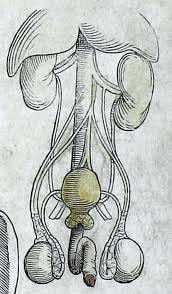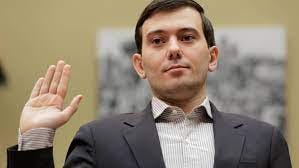Part I: Presidents, politics, prostate cancer, policy debates, transparency, the Constitution and taking the Fifth
More to come on the Austin case
By Howard Wolinsky
When the U.S. Constitution was written in 1787, the average age of the delegates was 42, and four of the most influential delegates—Alexander Hamilton, Edmund Randolph, Gouvernor Morris, and James Madison—were in their thirties. Several were in their twenties.
(AI imagines Alexander Hamilton considering the prostate as he shapes the U.S. Constitution.)
Prostates were not on their minds; they were so young, and they were focused on so many big issues. Hell, prostates barely were known then. Today, as you’ll see, prostates are a hot topic, a political football, as the Constitution comes into play in various ways.
(Part II will focus on the former DOD Secretary Gen. Lloyd Austin, who in 2024 underwent secret surgery for prostate cancer.)
The state of the art in medicine then could be traced back to Hippocrates, the Greek physician (360-470 BCE), and his humoral theory, which held that the body consisted of four humors (blood, phlegm, black bile, and yellow bile) that needed to be kept in balance for good health.
Treatments often focused on restoring this balance through methods such a bloodletting with scalpels and leeches and purges to induce vomiting, herbal remedies.
Smallpox vaccine had just emerged in 1796—along with vaccine skepticism, questioning safety and effectiveness and whether they were contaminated. The more things change … right?
(First 16th Century glimpse of the prostate—an underappreciated gland.)
The prostate had only been identified vaguely in ancient times and more formally in an anatomic drawings for the first time by Niccolò Massa, the Italian anatomist, in the 16th century. Science, as it was, didn’t really start to delve into the prostate until 1811—when the ink from the Constitution was still moist.
(Prostate anatomist Dr. Massa.)
Things have not changed that much since 1878 in terms of vaccine skepticism and maybe even prostate awareness—though U.S. Senators at an average age of 64 are near the common age for diagnosis of prostate cancer. (The average age of diagnosis is 67.)
Of the 94 male members of the current U.S. Senate, four have publicly disclosed they have prostate cancer.
That’s roughly the 4% incidence you’d expect in this age group.
All claimed early detection and underwent radical prostatectomy. I am compelled to ask: If detected so early, why did none go on Active Surveillance. I’d call for a Senate investigation as if that would do any good.
Ironically, this small, typically overlooked and underappreciated gland, especially in terms of government research funding lately in the face of a coming prostate “tsumami,” is increasingly in the eye of public policy storms in D.C.
Presidential health
The current tempest deals with President Biden’s recently announced diagnosis with advanced prostate at age 82 after stopping PSA screening—based on guidelines—at age 71.
Policy on Presidential health is in the public interest. Presidential candidates these days routinely release their health reports to reassure voters they are of sound mind and body.
Transparency is necessary. There has been a long history of presidential health cover-ups. Like Grover Cleveland’s secret cancer surgery on a yacht. Woodrow Wilson’s incapacitating stroke that left his wife and some aides in charge of running the country. The press helped conceal Franklin D. Roosevelt’s paralysis and his personal physician hid his failing health in his final days when the country was facing serious issues as World War II closed. Then, there was John F. Kennedy’s adrenal disease and Dr. Max Jacobson’s (the Secret Service called him “Dr. Feelgood”) amphetamine-laced injections.
Steven Quay, MD, columnist in the conservative magazine The Spectator World, said: “All were tucked away from public view while staff and doctors smiled for the cameras. But those deceptions happened in an era when ethics codes were less developed. Today, with 24-hour news cycles and biometric scrutiny, we expect better. We expect transparency, especially when the stakes are nuclear.”
Not surprisingly Republican critics have called into question what happened in Biden’s case—Who dropped the ball on screening? Was the public misled? What can be done to avoid these messes?—about his mental acuity and even his prostate cancer diagnosis.
No doubt the Republican Congress is out to embarrass a Democratic president. But there also ought to be a serious debate over the public’s right to know about Presidential health since these are not ordinary citizens. Our lives, health and welfare are in part in the hands of our leaders. We need them to be in tip-top condition.
There should be a bipartisan effort to look into improving policy on reporting candidate and Presidential health.
Taking the Fifth
The current kerfuffle involves the refusal of Biden’s long-time personal physician Kevin O’Connor, who Congress subpoenaed to address questions about Biden’s health and whether he’d ever been pressured to misrepresent it.
But O’Connor declined to answer questions. He didn’t claim patient-doctor confidentiality. He didn’t invoke HIPPA. O’Connor took The Fifth.
Delegate and future President James Madison largely wrote the Fifth AMendment to the Bill of Right, which outlines several key legal protections, including the right against self-incrimination, the right to due process, and protection against double jeopardy
We don’t know whether Biden asked O’Connor not to testify or would even try to exert some sort of executive privilege.
ABC News reported: “In an unprecedented move, the Republican-led House Oversight Committee released a video of former President Joe Biden's White House physician's deposition behind closed doors on July 9.
"On the advice of counsel, I must respectfully decline to answer based on the physician patient privilege and the reliance on my right under the Fifth Amendment," O'Connor said as he exercised his Constitutional right to remain silent and not incriminate himself.
Sad.
Invoking the Fifth calls up many famous incidents:
Mark McGwire: During a 2005 House committee investigation into steroid use in baseball, the former St. Louis Cardinals slugger refused to answer questions about his past, invoking his Fifth Amendment rights multiple times.
Martin Shkreli: The former pharmaceutical executive pleaded the Fifth Amendment in a Congressional hearing regarding his company's decision to drastically increase the price of a life-saving drug.
The optics of the Fifth are bad. Was O’Connor protecting himself or his President, Joe Biden? Health issues typically are private. But should Presidential health issues be private?
Paul Schellhammer, MD, a urologist, a prostate cancer patient and former president of the American Urological Association, told me: “When one decides to run for President of the USA, and /or hold the office of the president of the USA you are protected from external dangers by Secret Service, (you can’t walk to the grocery store on your own to buy a quart of milk.), you fly on Air Force One (you can’t get on the United Airlines commuter jet)
“The candidate for and the occupier of the presidential office agrees to the fact that their external environment will be planned and protected to the last detail for their safety which translates to the safety of the country-therefore it would seem to stand to reason that such an individual's internal environment (bodily organs and their health status) needs precise and careful monitoring and care above and beyond what might be appropriate/recommended for the everyday citizen. It goes with the territory that they have signed up to occupy.”
Come to the ASPI webinar on genetics—and respond to a couple surveys, please
ASPI (Active Surveillance Patients International) has assembled a panel of genetics experts to address genetic and prostate cancer.
The session will run from noon to 1:30 pm Eastern time on Saturday, July 26.
Please register for the meeting here.
There will be a Question-and-Answer session following remarks by the panel. Please send questions in advance to: contactus@aspatients.org
Please respond to my confidential survey on genetic testing and PCa. Click here: https://forms.gle/Uv9d5gaZYHadZ5Qh9
Also:
Please answer this questionnaire on transperineal vs. transrectal biopsies: https://forms.gle/GShpHwegEPtAVgTs9 I have a relevant story coming, and you can take a few minutes and help if you haven’t already.
Please respond to my survey on your experience with MRIs: https://forms.gle/kuQVP4bDhEsm3RLV9








Great piece, but that prostate in the Continental Congress image is just über creepy.
Hi Howard, This was a needed and thoughtful essay. Thanks for keeping the question about disclosure of Presidential health and prostate cancer in men beyond sixty-five years of age in the foreground. Personally, in order to encourage discussion, I'll add my opinion. I do not believe Biden stopped getting PSA testing at seventy-one. I think that is a lie. I believe he was on hormone therapy for several years after learning that he had PCa, and his supporters and the DNC kept his medical situation quiet. The HT contributed to his cognitive issues during his Presidency. If so, this will be an eye opening revelation, and the DNC, his docs and his support staff have some serious questions to answer. It supports the logic that Biden never admonished Lloyd Austin for his disappearance to get his RP. Biden couldn't say anything about Austin's attempts to keep his own PCa private when Biden was concealing his own.
This non-transparency of Presidential health is bull shit! If you choose to try and become elected President, you need to be prepared to be totally open about your health. Guys, be ready to pull down your pants. Nothing is private anymore.